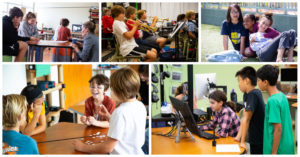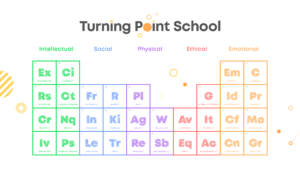 As anyone who spends time with children in the “tween” years can attest, adolescence is a magical place. At Turning Point, we not only understand the challenges of middle school, but we embrace and truly enjoy the opportunity we have to work with adolescents during these years of incredible growth.
As anyone who spends time with children in the “tween” years can attest, adolescence is a magical place. At Turning Point, we not only understand the challenges of middle school, but we embrace and truly enjoy the opportunity we have to work with adolescents during these years of incredible growth.
The stereotype of adolescence is a deficit model, where the adolescent brain is treated as a lesser version of the adult brain, which has fully-formed prefrontal cortices. At Turning Point, we know through neuroscientific research that this deficit model is not the best way to think about or teach our middle school students; rather, it is most effective to recognize and capitalize on the fact that teenage brains are constantly rewiring, and therefore incredibly influenced by experience and learning.
Remember that historically it was adolescents who ventured out on their own; to leave their tribes, adolescents need decision-making skills. These skills and the neural circuitry that undergirds them are not inferior to those of adults, just different…and sometimes we do not like the kinds of decisions the adolescent brain makes! But rather than throwing up our hands and chalking up what we so clearly see as poor decision-making to a brain that is just under-developed, we should view this as an opportunity.
When we consider that the teenage brain is always radically rewiring, we can use this enhanced plasticity to help direct them towards positive experiences that are both affirming and rewarding. The transitional age of 11-13 seems to be very influential in the brain’s development of connectivity and real-life decision making. We want our middle school students to be exposed to a range of positive experiences and opportunities to acquire leadership and independence skills. Note that these are key elements in Turning Point’s Table of Elements, in the social and emotional categories.
According to Dr. Linda Wilbrecht, of UC Berkeley’s Center on the Developing Adolescent, the adolescent brain is “sampling widely and then settling down with connections that are appropriate in its environment.” She characterizes teen brains as “specialized to explore and make decisions under conditions of uncertainty at the age of independence.” For instance, teen brains allow them to switch from one behavior to another quickly when the situation calls for it. In contrast, adults are more likely to continue trying the same strategy to solve a problem even when it is clearly not working. The teenage brain absorbs experiences and builds the decision-making habits that will last long into adulthood.
We invite you to come see how our middle school program is designed to support this exciting and important time of brain development and personal growth. We are not protecting these young people from their “defective” brains; we are honoring this unique time of neural rewiring, which keeps our students engaged and able to take risks in a safe, inclusive environment.
Warmly,
Laura
Dr. Laura Konigsberg
Head of School
lkonigsberg@turningpointschool.org



































